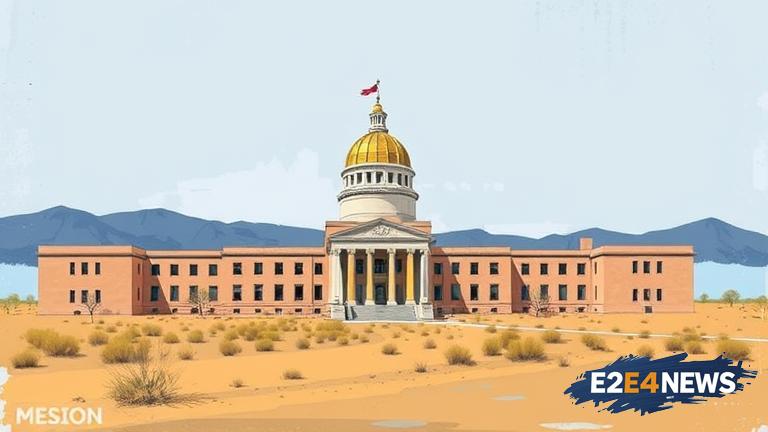New Mexico is bracing itself for a potential special legislative session to tackle the contentious issue of ICE detention facilities. The state’s lawmakers are planning to introduce a bill that would regulate these facilities and ensure the humane treatment of detainees. The proposed legislation, dubbed ‘Big Beautiful Bill,’ aims to address concerns over the living conditions, healthcare, and due process rights of individuals held in ICE custody. Proponents of the bill argue that it is essential to protect the dignity and human rights of all individuals, regardless of their immigration status. The bill’s sponsors claim that it would provide a framework for the state to oversee and monitor ICE detention facilities, ensuring that they comply with federal and state laws. The proposed legislation has sparked a heated debate, with some arguing that it would undermine national security and others claiming that it is a necessary step to prevent human rights abuses. New Mexico has been at the forefront of the national debate on immigration, with the state’s unique geography and demographics making it a critical location for border control and immigration enforcement. The potential special legislative session is expected to be highly contentious, with lawmakers from both parties deeply divided on the issue. The state’s Democratic governor, Michelle Lujan Grisham, has expressed support for the bill, while Republican lawmakers have voiced opposition, citing concerns over public safety and national security. The ICE detention facilities in New Mexico have been the subject of controversy in recent years, with allegations of mistreatment, neglect, and abuse of detainees. The facilities have also been criticized for their living conditions, with reports of overcrowding, poor sanitation, and inadequate access to healthcare. The proposed bill would require ICE detention facilities to comply with state and federal laws, including the provision of adequate food, water, shelter, and medical care. It would also establish an oversight mechanism to monitor the facilities and ensure that they are operating in accordance with the law. The bill’s sponsors argue that it would help to prevent human rights abuses and ensure that detainees are treated with dignity and respect. However, opponents of the bill claim that it would create a sanctuary state for undocumented immigrants and undermine the authority of federal immigration authorities. The debate over the bill is expected to be intense, with both sides presenting passionate arguments. The potential special legislative session is likely to attract national attention, given the high stakes and the divisive nature of the issue. New Mexico’s unique cultural and demographic landscape makes it an important testing ground for immigration policies, and the outcome of the special legislative session could have far-reaching implications for the state and the nation. The state’s lawmakers are under pressure to find a solution that balances the need to protect national security with the need to uphold human rights and dignity. The proposed bill has sparked a wider debate about the role of state governments in regulating federal immigration policies, with some arguing that states have a critical role to play in protecting the rights of immigrants and others claiming that it is a federal issue. As the special legislative session approaches, lawmakers are preparing for a fierce battle, with the outcome hanging in the balance. The people of New Mexico are watching closely, aware that the decision will have a significant impact on the state’s reputation and its relationship with the federal government. The ICE detention facilities in New Mexico have become a symbol of the national debate on immigration, with the state’s lawmakers at the forefront of the struggle to find a solution. The proposed bill is a critical step towards addressing the concerns over ICE detention facilities, but its passage is far from certain. The special legislative session is expected to be a defining moment in the state’s history, with the outcome likely to shape the course of immigration policy in New Mexico for years to come.
